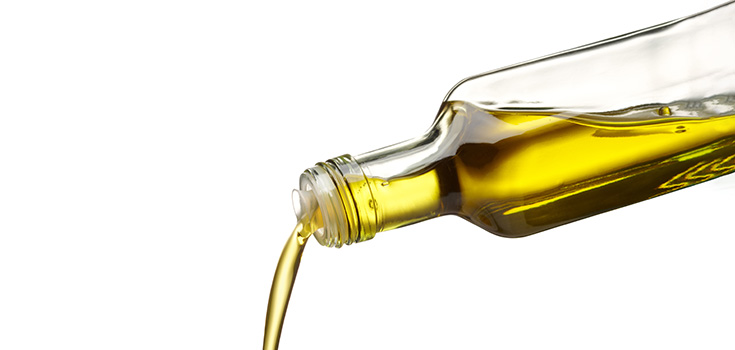Olive Oil You Buy is Often Low-Quality and Fake

Olive oil currently stands at a $720 million industry in the United States alone. The meteoric rise of the oil over the past few years has everything to do with its many known health benefits. People have started to realize that they should not be consuming harmful, unhealthy vegetable oil, and would rather consume an oil that has been shown to fight breast cancer, protect against stroke, and possess many anti-inflammatory benefits.
Olive Oil You Buy is Often Low-Quality and Fake
Tom Mueller, the author of Extra Virginity: The Sublime and Scandalous World of Olive Oil, explains how an undercover cop let him in on the whole olive oil scandal. Many olive oils created by profit-seeking companies actually contain harmful and unneeded chemicals added to disguise the cheap olive oil with artificial flavoring. Consumers are quick to respond to quick-sell labels like ‘Made in Italy’ and ‘Cold Pressed’, but what they don’t know is that these low quality olive oils are shipped to stores that don’t undergo rigorous quality control.
“I was sitting in a dark bar with an undercover cop in Italy, and he was telling me about deals being cut with high-level politicians and millions of dollars in EU subsidies being misappropriated…He was speaking in this hushed tone, and I had to laugh, because this was not black-market plutonium or drugs, this was olive oil,” Mueller said.
Of course this information can’t be too surprising seeing as other ‘healthy’ products such as honey have been found to be fake and nutrient-depleted. The study showed that at least a whopping 3/4 of the honey sold in the US is not real honey according to Food and Drug Administration standards. Not only that, but many ‘natural’ cereal products have been caught containing pesticides and genetically modified foods.
Next time you shop for olive oil be sure to notice a few things:
- ‘Extra-Virgin’ holds little meaning – The term ‘extra-virgin’ simply means the product requires a chemical and sensory component. The chemical component means the product is freshly and properly made and the sensory component says it can not have a bad smell or taste as well as perceptual fruitiness. Anything can be sold as extra-virgin, and it could be made poorly and cheaply. Extra-virgin olive oil should smell fruity without any mustiness.
- ‘Pure’ – When olive oil touts ‘pure’ on the label it means it has been refined and processed with chemicals. The oil is actually less pure than before, and now is refined and chemically altered.
- Price Tag – Generally speaking, olive oil should not be really inexpensive. The product itself is quite pricey to produce, so a very inexpensive olive oil may actually be cheap, low quality olive oil.
- Buy from a company you trust – Many companies are actually owned by larger mega-corporations. Many mega corporations like Kraft have begun releasing products under brands that appear to be environmentally and health conscious, yet they utilize the same dirty tricks of their parent companies through deceptive labeling and incomplete information. Stick with companies you know genuinely care about selling a quality product.
Unfortunately consumers have to really be on the lookout when shopping these day, even when shopping for healthy products.

What Mueller says in his book is worrisome. I've recently come across a new organic olive oil called Frank that's founded upon openness and honesty in its production processes, which seems very timely. You can see videos of each stage of its growing and production processes up online along with interviews with its farmers. Maybe this is just what the olive oil industry needs, check it out at http://www.frankorganics.com.
Some problems with this story: The North American Olive Oil Association has been testing olives oils purchased at U.S. supermarkets for more than 20 years and has found almost no problems. That just doesn't sell as many books as tales about clandestine meetings with undercover cops. This is all much ado about nothing.
Same with the honey story. There is no FDA standard of identity for honey, although the industry has been asking for one for years. However, in order for honey to be called USDA grade A honey, the pollen must be removed. That's where the 3/4 claim comes from. Wonder why the author – of the original article, not this one – didn't include that key point in his story.
Truth is, there are some problems in both sectors. However, trade groups in both sectors continually work hard to monitor the market, so only a very small percentage of what's available has any problems. Also, companies within both sectors regularly test one another's product. If there were problems, they'd make sure people found out.
You do understand all those quart jars screwed upside down on top of the bee hives contain "corn syrup" do you not? Now how many beekeepers have those jars on top of there hives?
my guessing is that since more people are not buying gmo's corn/soy/canola or another gmo's oil, people are buying more olive oil and when the market gets hot, manufacturers will do tricks to capture more money..
What are some brands we can trust? I am in Canada.
Believe or not the Portuguese olive oil are the best . They still use old and natural methods to produce them. But, like everything the cheep ones must be avoided.
I am in love with Spanish olive oil and Carothers' is a company that has been around for a while and I trust the people who run it and the quality of the olive oil. It is wonderful oil. Check it out at : http://www.carothersoliveoil.com/store.
Doesn't do us much good unless they name and shame the companies caught out selling fake olive oil.